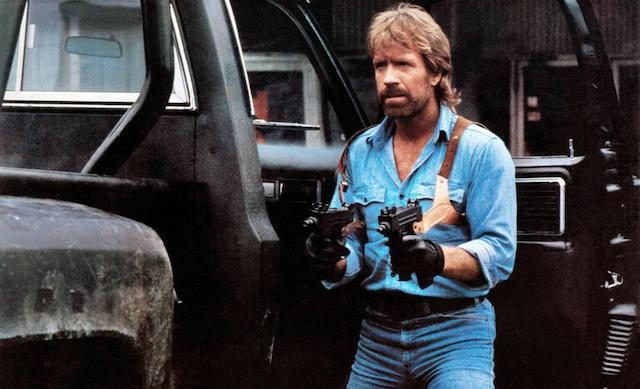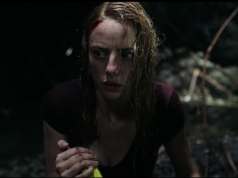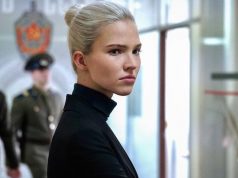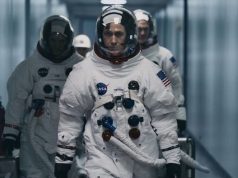
One of our favorite pastimes in the 1980s was fantasizing about what would happen if Russia invaded us, and how awesome it would be to teach those Commie bastards a lesson. Thanks to hilarious comedies like “Red Dawn” and “Invasion U.S.A.,” we were secure in the knowledge that if it came down to it, America would be rescued by Chuck Norris, or some high school students, whoever was available. Either way, we felt safe.
The Russians who invade the USA in “Invasion U.S.A.” do so with a plan that is almost laughably naive. All they have is some weapons and a couple dozen guys. The weapons are just guns and rocket launchers, nothing nuclear or biological. And the guys are just random extras from Central Casting, not Iron Man or the Terminator. This is how they’re going to defeat one of the world’s superpowers? And on its own turf? Absurd! Almost as absurd as the fact that it almost works!
Like most films from the ’80s, this one stars Chuck Norris as a man who used to work for the government and is called back into action because he’s supposedly the only person who can do something. If the films of the ’80s are to be believed, the government is constantly allowing its few competent agents to retire, only to require their services again when something comes up. In this case, Norris’ character, named Matt Hunter, is a dumb Florida redneck who spends his days tying up alligators, because this is what dumb Florida rednecks do. He is needed because his old archenemy, Mikhail Rostov, is trying to perpetrate a deadly plan.
“We believe Rostov is in the country,” says the suit-wearing government man who paddles out to the malarial shack in the Everglades that Hunter calls home.
“You should have let me kill him when I had the chance,” Hunter replies. “Now he’s your problem.”
Well, that’s a fine attitude! Rostov wants to do goodness-knows-what to America, and Hunter doesn’t care because he’s mad that he wasn’t allowed to kill him before. Hunter just wants to spend his golden years tying up alligators and swatting at skeeters. The rest of you can all go straight to hell. Fortunately, Rostov soon kills Hunter’s friend, an old Indian guy named John Eagle, so now Hunter has a personal reason to get involved. Hunter never assists in the defense of his country out of patriotism, only out of spite or revenge.
But we are getting ahead of ourselves. This Rostov character, played by melty-faced movie baddie Richard Lynch, has a plan that is indeed dastardly, not to mention elaborate. It has to be elaborate! America is not an easy country to take over and/or destroy, regardless of what the success of “Jersey Shore” has implied. Rostov cannot focus on the mission, though, because he knows his old nemesis Hunter is still out there. Rostov literally has nightmares about Hunter catching him. That’s the sort of detail that is realistic — even ruthless murderers have subconscious fears, after all — but that most movies would omit because it is unintentionally hilarious for your fearsome villain to have bad dreams. Rostov tells his henchmen that Hunter must be killed before the mission can begin, and before he can start sleeping without a nightlight. Next thing you know, Rostov and friends are on little boats headed for Hunter’s swamp hovel, which I guess is listed in the phone book or something. They don’t get Hunter, but they do take out John Eagle, so now it’s personal, etc., etc.
“I’ll take the assignment,” Hunter now tells his government handler. “But remember — I work alone.” You may recall this line of dialogue from the time you heard it in every other movie made between 1980 and 1989.
Anyway, what is Rostov’s plan? It goes like this. First he and his crew impersonate the U.S. Coast Guard, slaughter a boat full of Cuban refugees, and steal the cocaine they were smuggling. (A few kilos of cocaine comes standard on all seagoing vessels manufactured in Cuba.) Then Rostov takes the cocaine to a Miami drug kingpin, trades it for a bunch of weapons, then kills the kingpin and his lackeys. For good measure, Rostov also jabs a cocaine straw through a woman’s nose mid-snort, then throws her through a window. I don’t mind telling you, Rostov is kind of an a-hole. He uses the weapons he has acquired to arm his private little military, which consists of about 30 guys who sneak into America by, um, sailing some boats right up to the shore of Miami Beach. Where did they sail from? Don’t know. Where and how did Rostov recruit them? Don’t know. How did they sail into American waters without being detected? Ah, that we do know. They waited until it was nighttime.
Take heed, enemies of America! If you are going to invade our country, you are going to have to stay up late!
The next step is for Rostov’s tiny band of mercenaries to do some random killing. They shoot up a suburban neighborhood, open fire on a block party, and blow up a shopping mall. It is Christmastime, by the way, so all of this seems even more despicable than it normally would, although I confess I’ve wanted to detonate a bomb every time I’ve been to a mall in December, too. Rostov’s idea is to send America into a state of anarchy by spreading pain and misery, which you may recall was also the idea behind Domino’s chicken wings.
Soon panic has gripped the streets of Miami — and, we are told, the rest of the country! Because apparently Rostov has teams everywhere else, too, perpetrating similar acts of mayhem! Apparently! The movie does not show this to us. “Just take our word for it,” the movie says. “This chaos and destruction you’re seeing in Miami is happening all over America, in scenes as dazzling and expensive to shoot as these! We mean it!”
What is Hunter doing during all this? Oh, he’s doing his best to stem the tide of mass slaughter. He actually does pretty well, considering he’s only one guy, and evidently the police and military aren’t interested in participating. Maybe they took his whole “I work alone” thing too literally. Hunter drives around in a pickup truck and somehow stumbles upon the scene of just about every Miami-based attack after the first few. The bad guys will put a bomb someplace comically inappropriate — on the side of a school bus or outside a church, to name two — and Hunter will retrieve it, bring it back to them, and blow them up with it. He learned this trick from his wise old sensei, Bugs Bunny.
Hunter eventually saves America by killing Rostov, which you’ll remember is what he wanted to do in the first place. Why the death of Rostov means his allegedly numerous armies will automatically cease their work of destruction is not explained. It’s not like he was a sorcerer and they were his creations. But we have taken the movie at its word so many times already that there’s no sense losing faith now. However it happened, Hunter saved America, so thank goodness he came out or retirement, because certainly nobody else could have fired a gun at Rostov.
But what is the movie trying to say? Are we supposed to think Rostov’s plan for defeating America is scarily plausible, and that Hunter is a brave hero for single-handedly stopping it? Or are we supposed to think America is so weak it can be brought to its knees by one nightmare-prone Russian and a handful of goons, and that Hunter is a bitter crank who’s willing to leverage his countrymen’s lives to settle an old score? Is the point that America has brought this threat upon itself by being weak in the past, i.e., by not letting Hunter kill Rostov years ago? Or is the point that we need to recruit more assassins so that we’re not always having to call the old ones out of retirement? These questions linger long after the eggy scent of the movie has dissipated.
— Film.com





